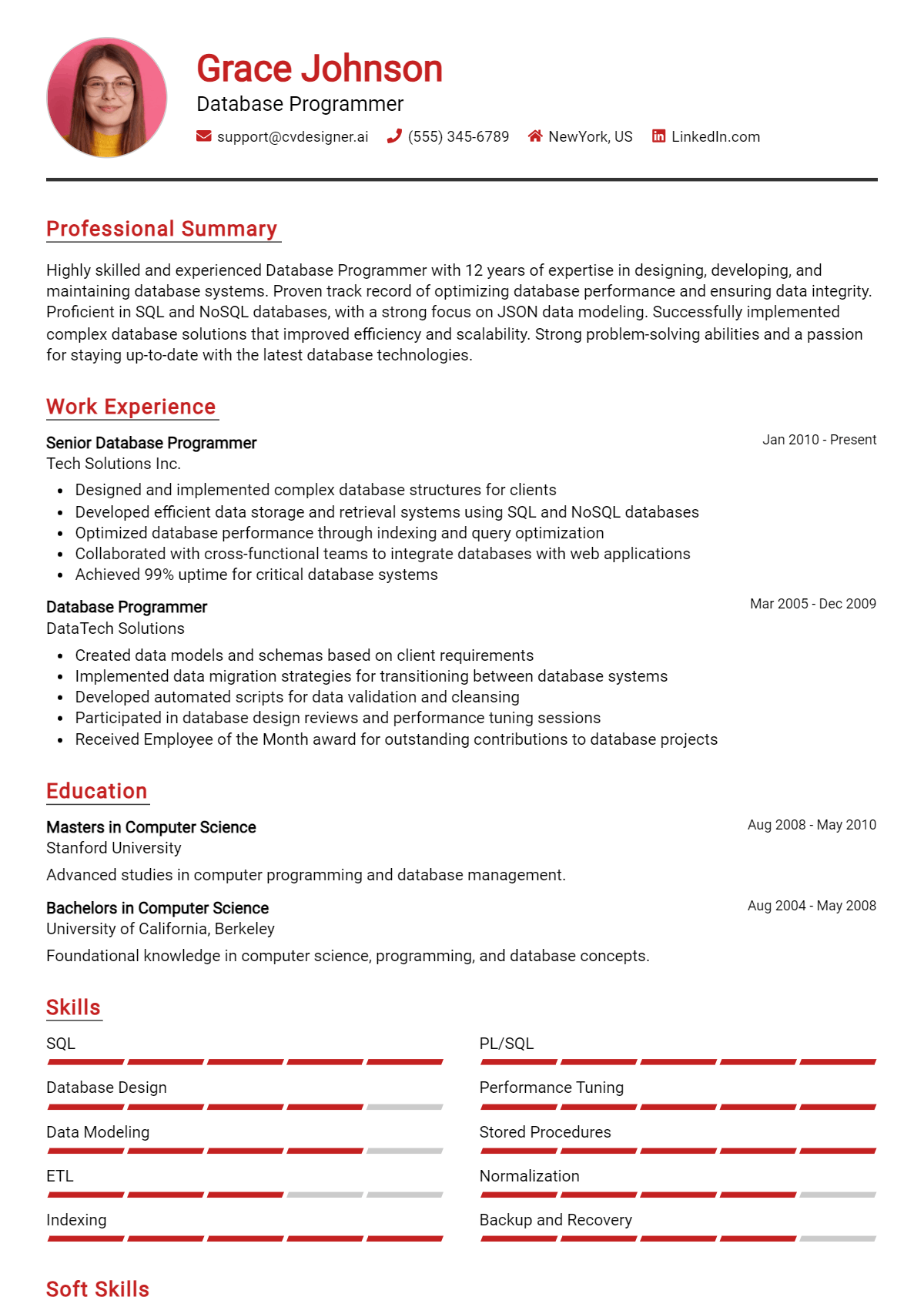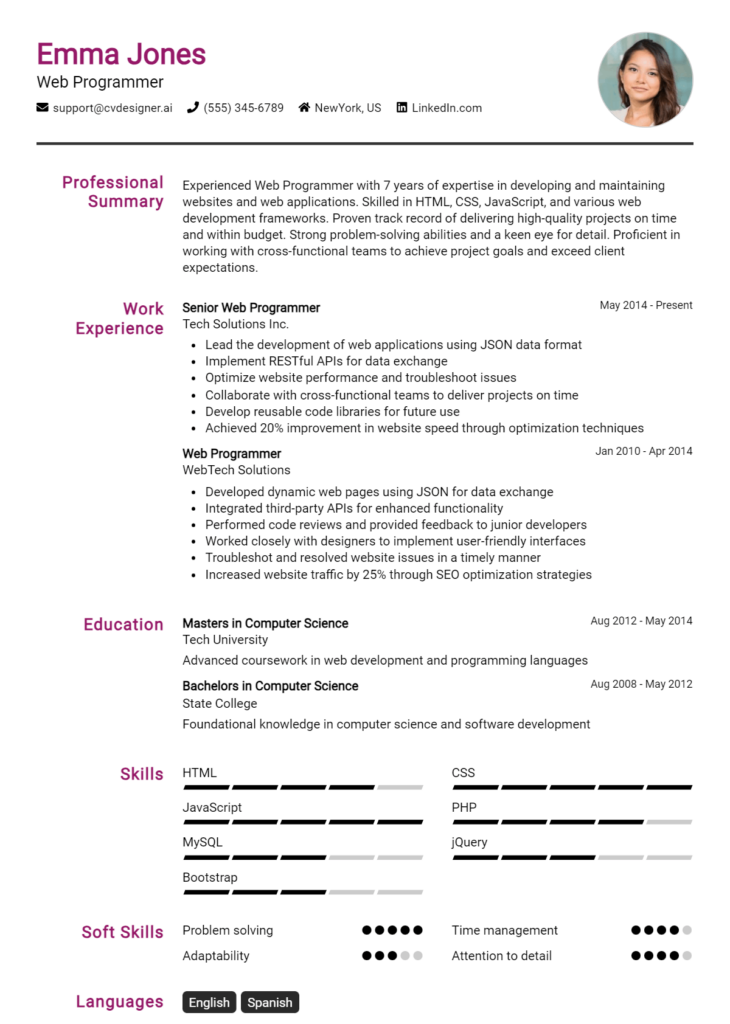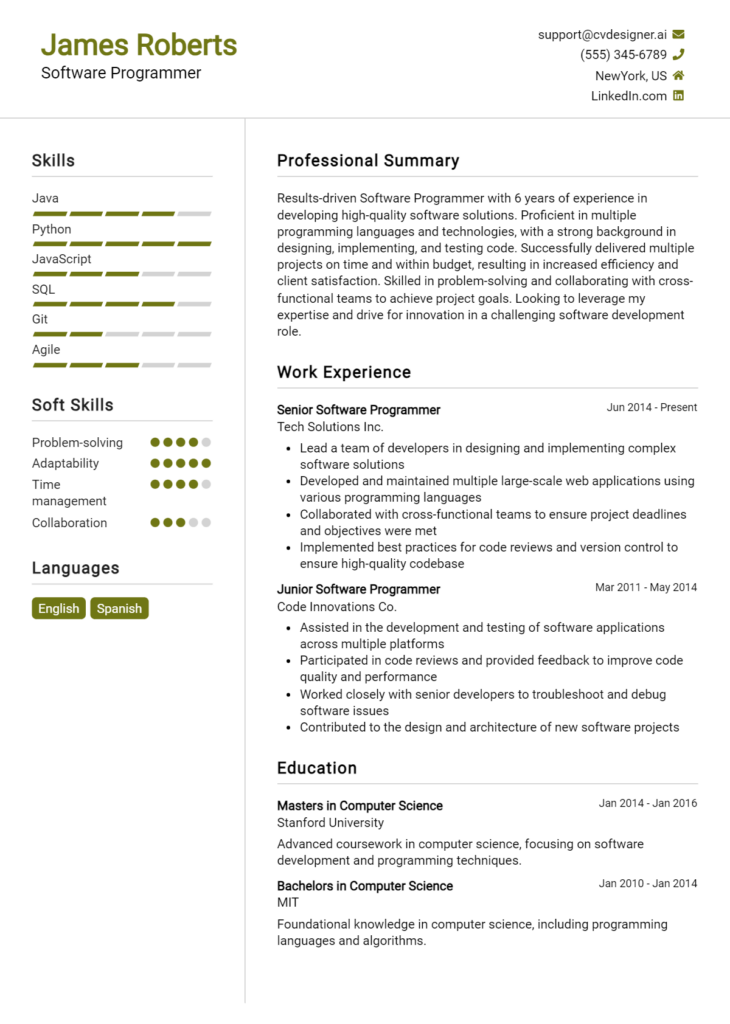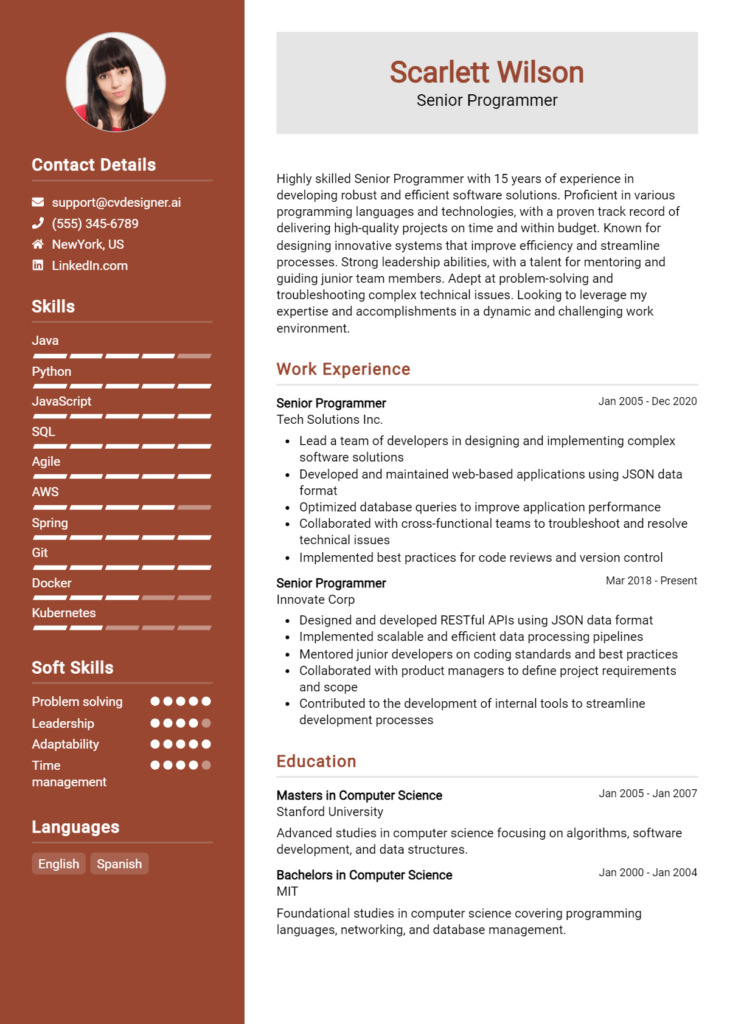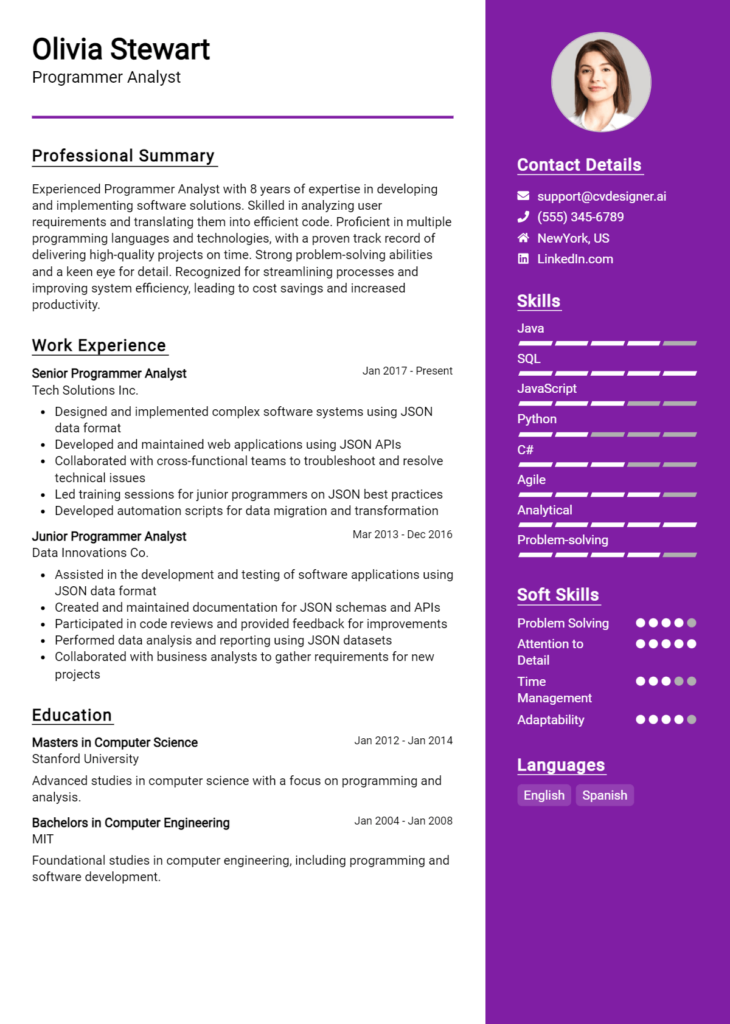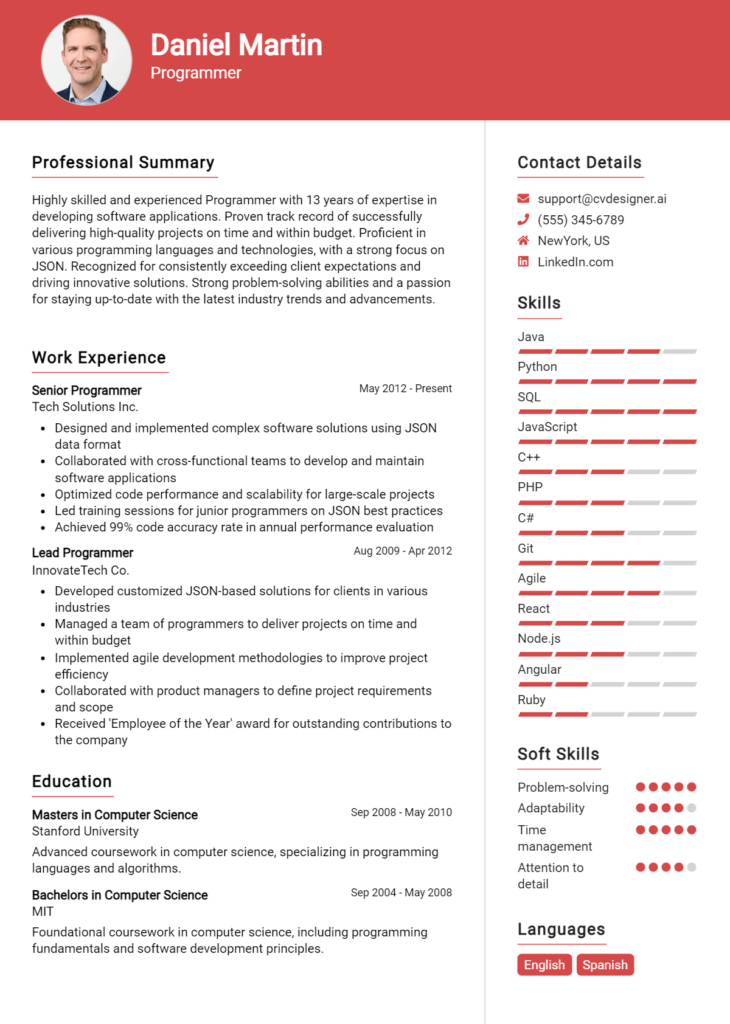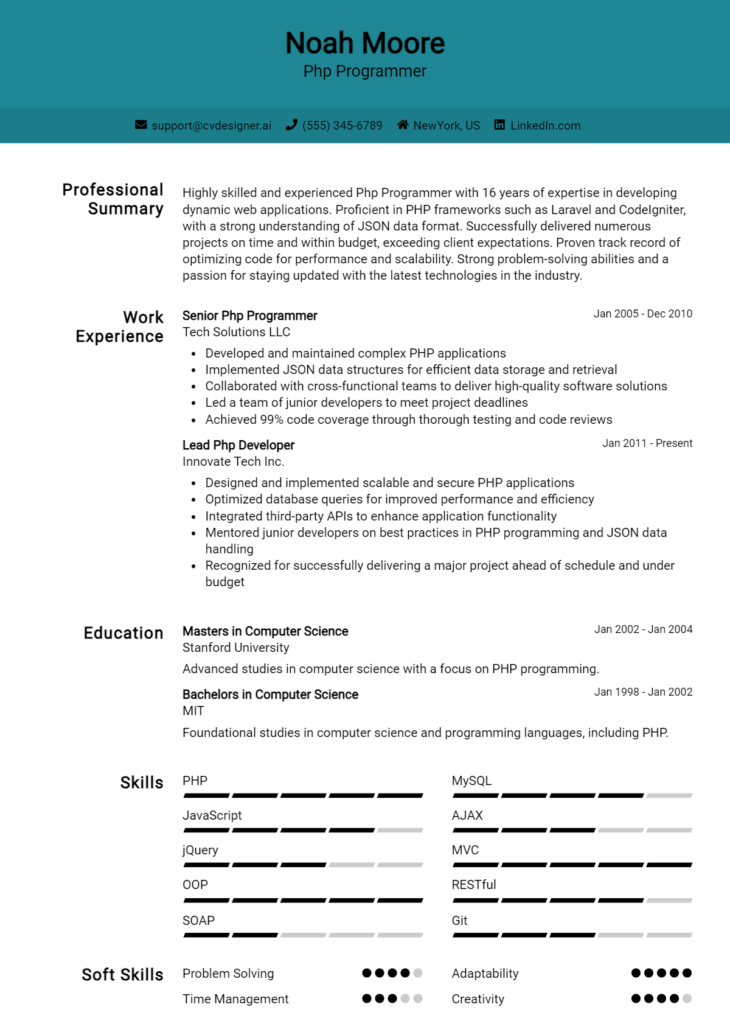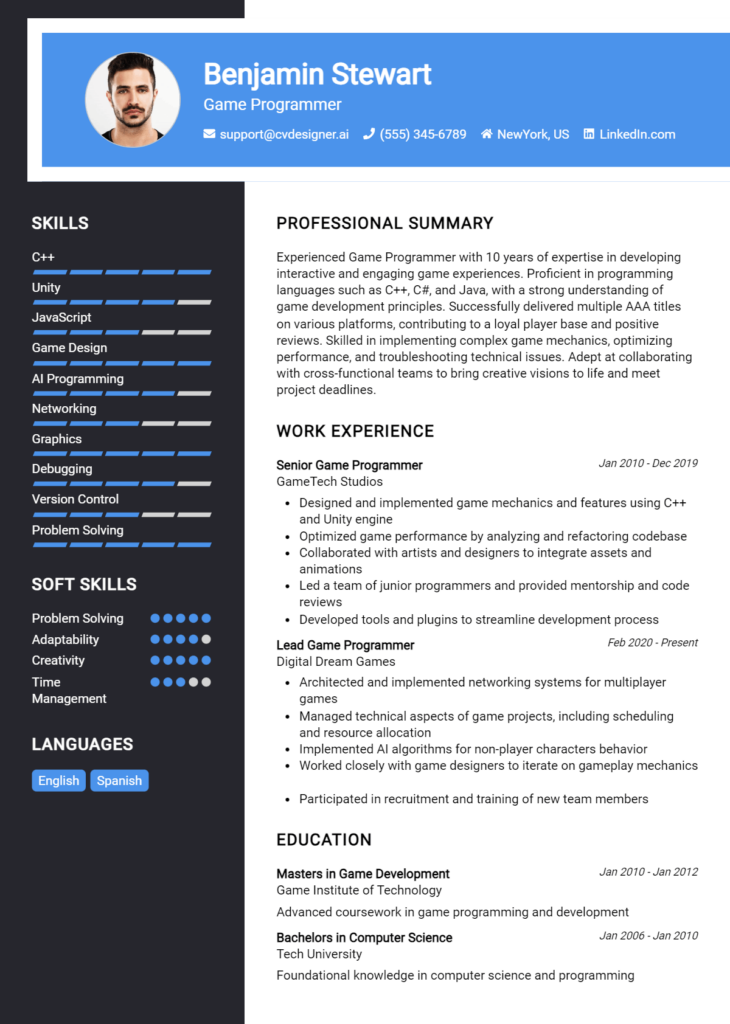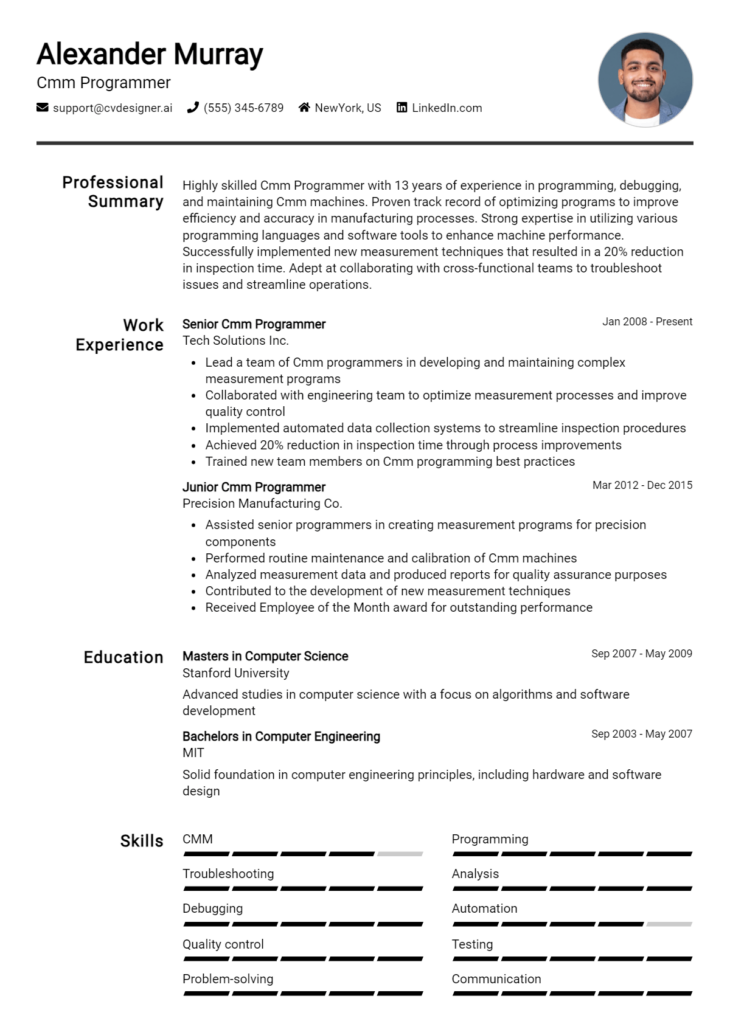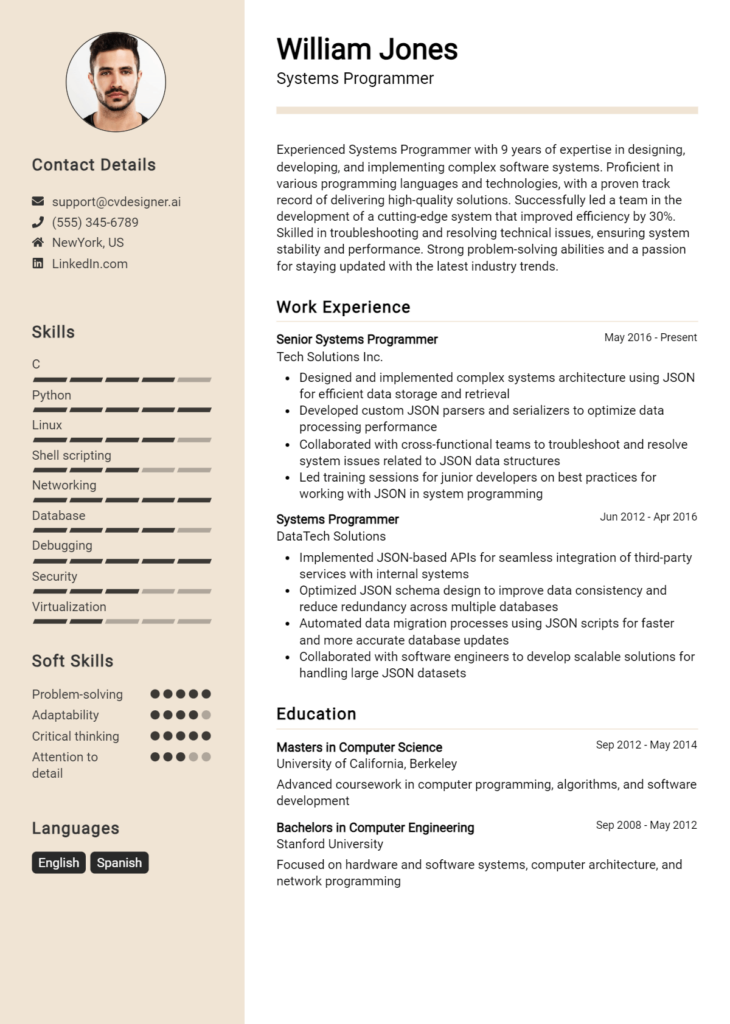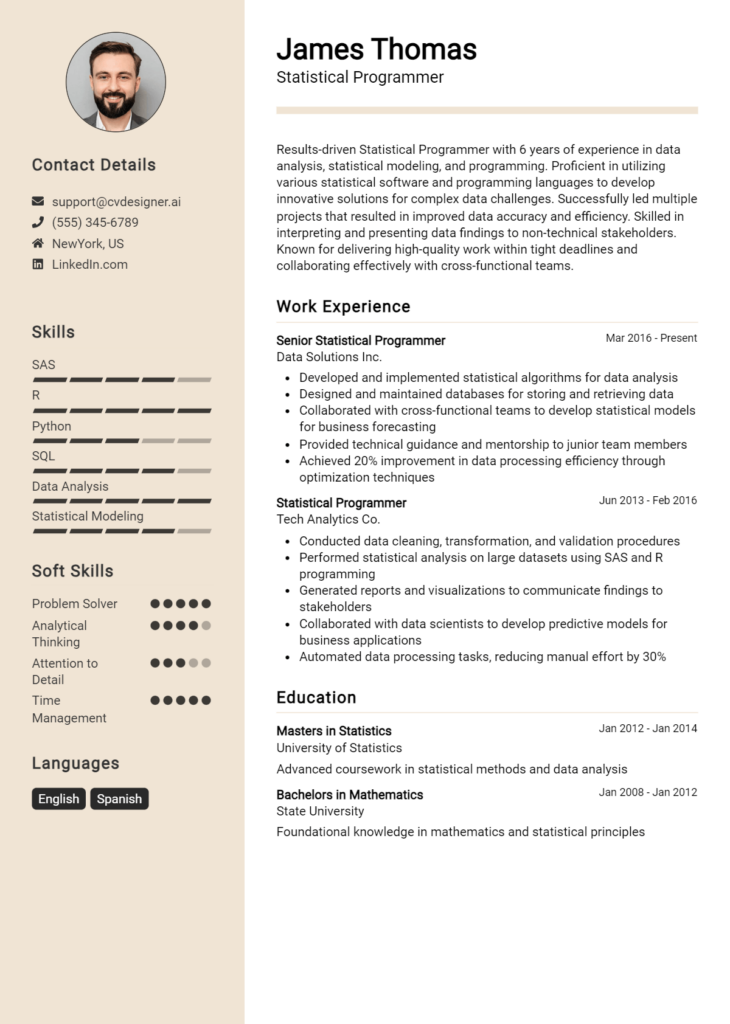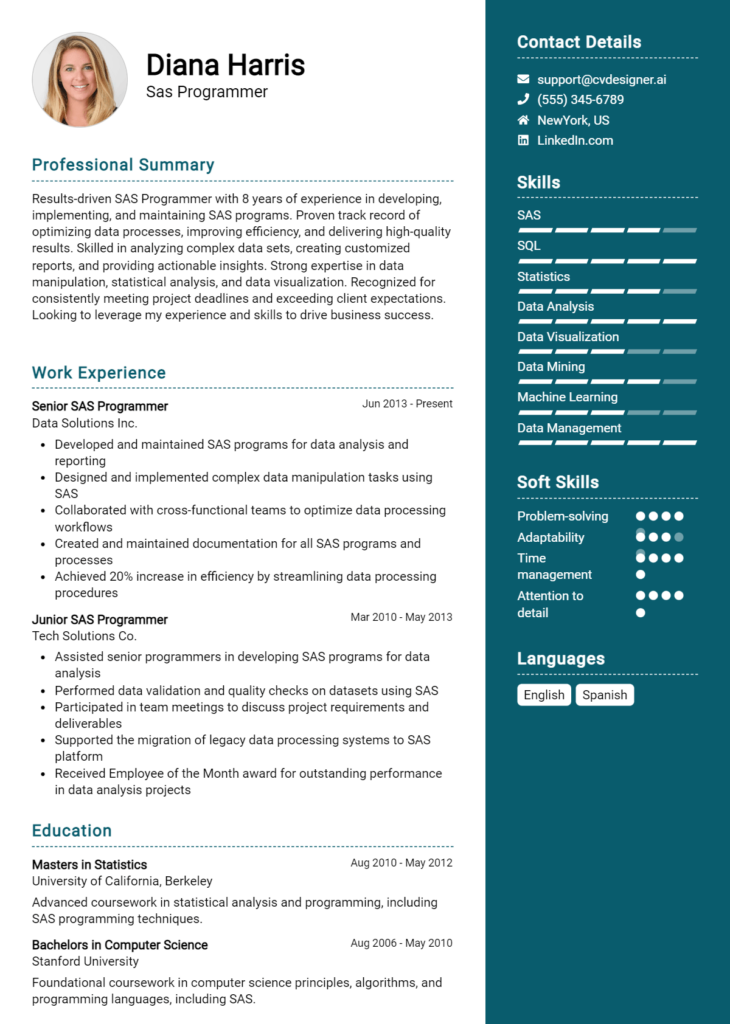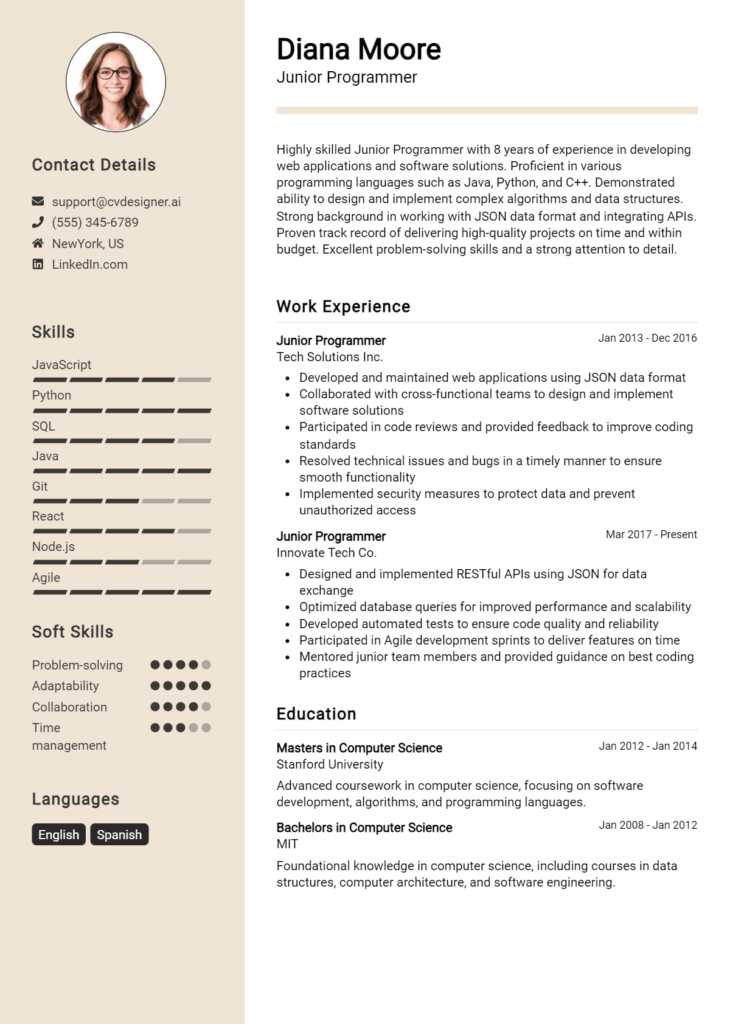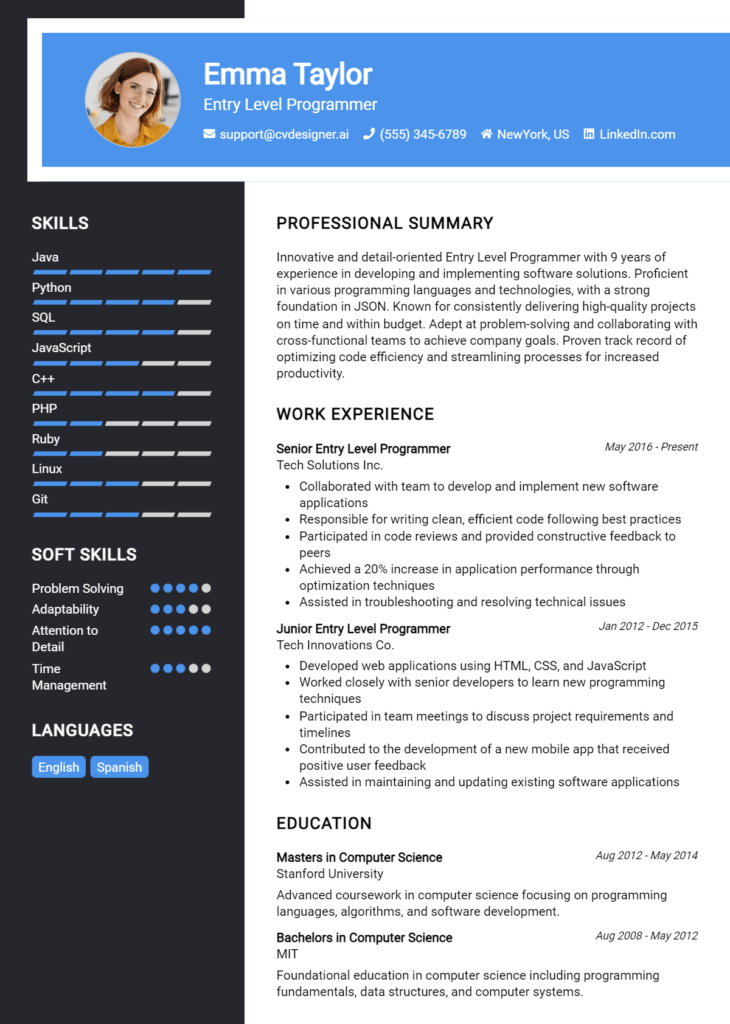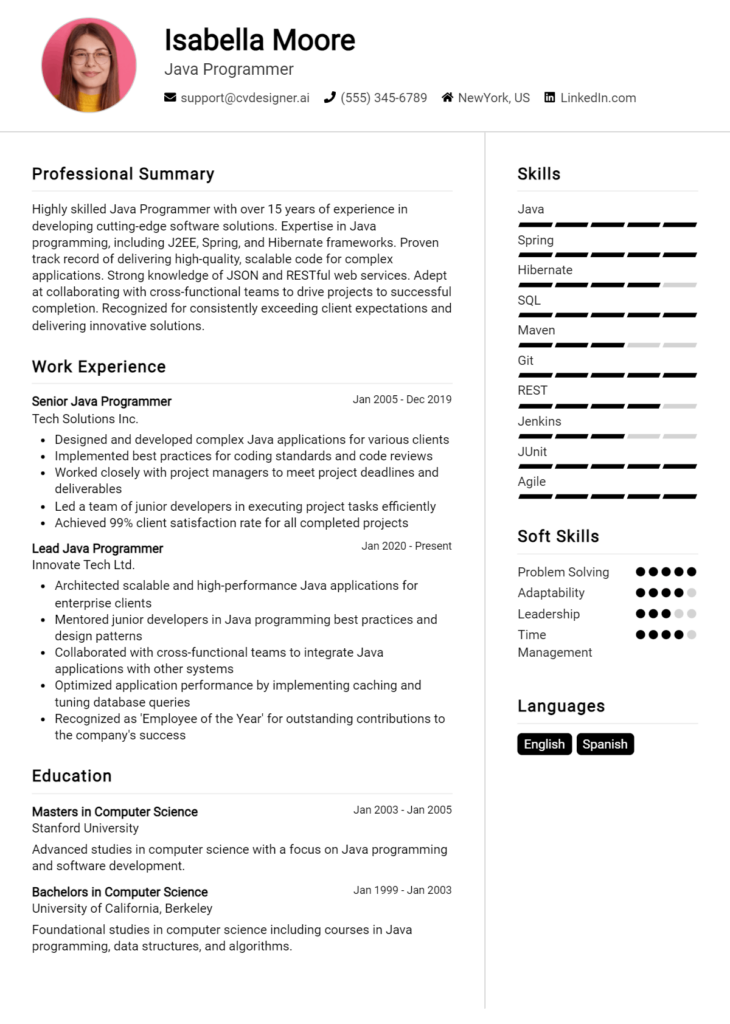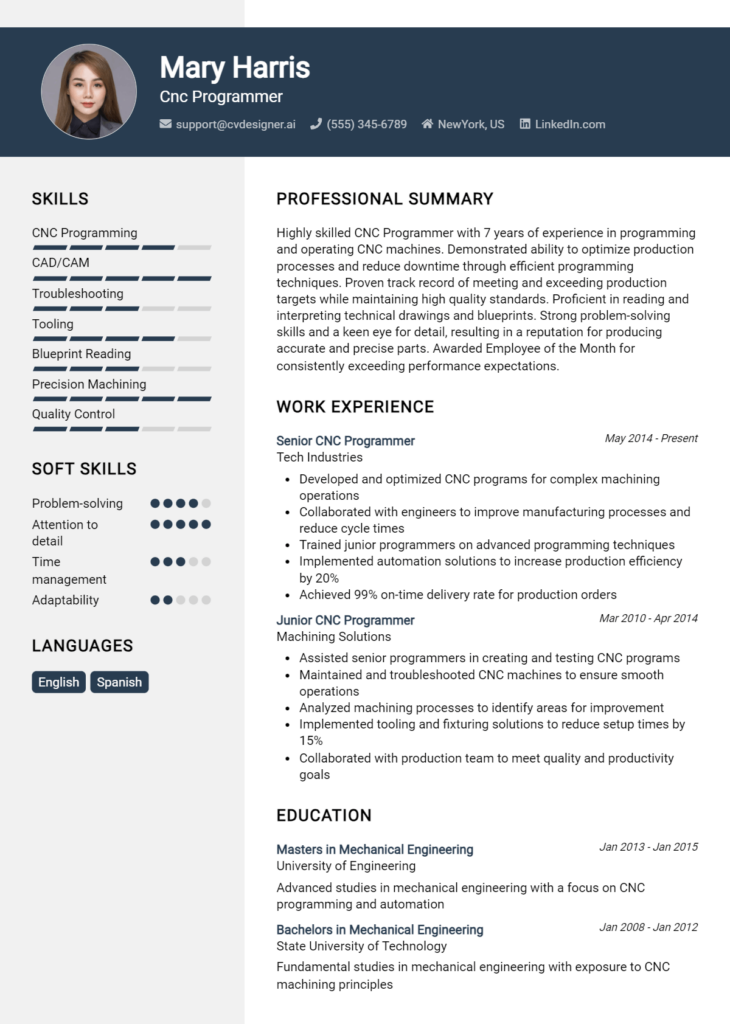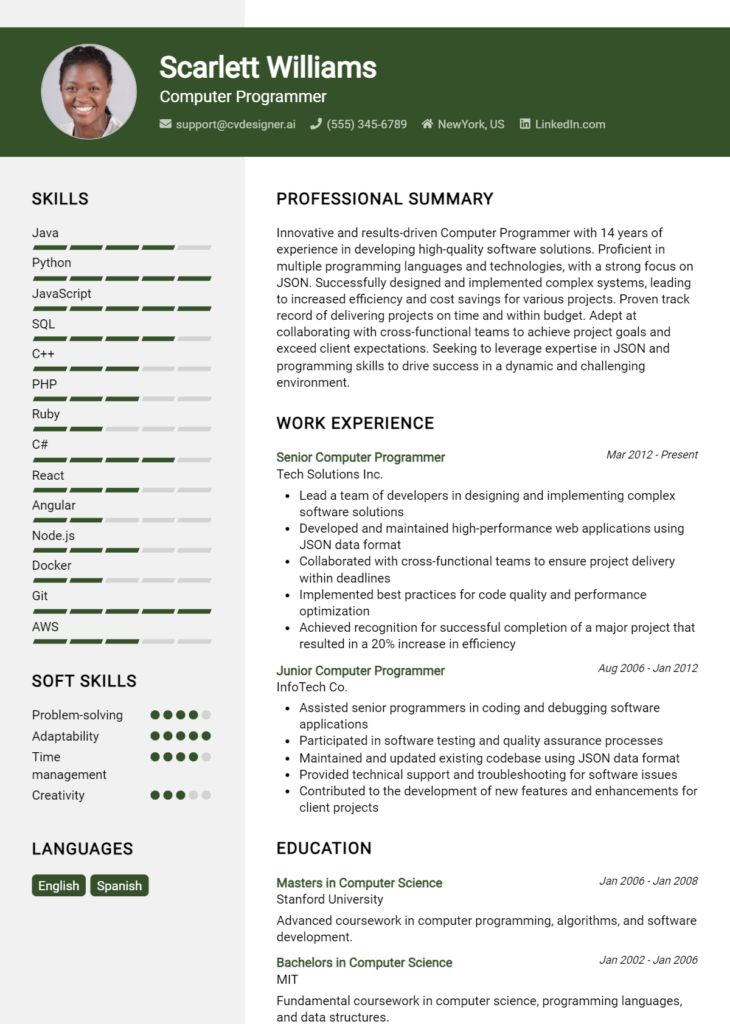Most Popular Database Programmer Resume Examples
Explore additional Database Programmer resume samples and guides and see what works for your level of experience or role.
As the backbone of information management, Database Programmers play a crucial role in designing, implementing, and maintaining the systems that store and retrieve data for organizations across various industries. In today’s data-driven world, the ability to effectively manage and analyze data is indispensable, making the demand for skilled Database Programmers higher than ever. However, landing a position in this competitive field requires more than just technical expertise; it necessitates a meticulously crafted resume that highlights your skills, experiences, and potential contributions to prospective employers. In this article, we will guide you through the essential elements of a standout Database Programmer resume, ensuring you present yourself as the ideal candidate for the job.
We will cover the core responsibilities of a Database Programmer, the essential skills that employers look for, and the best formats to showcase your qualifications. Additionally, we will highlight common mistakes to avoid while writing your resume, provide examples suitable for all experience levels, and offer practical tips on crafting an effective resume. You’ll also find guidance on selecting the right resume templates that align with your personal brand and the specific demands of the tech industry. With this comprehensive guide, you'll be well-equipped to create a compelling resume that captures the attention of hiring managers and opens the door to your next career opportunity.
Key Responsibilities and Skills for a Database Programmer
A Database Programmer plays a crucial role in managing and optimizing an organization's data structures and ensuring data integrity. Their key responsibilities typically include:
- Designing, implementing, and maintaining database systems to support business applications.
- Writing and optimizing SQL queries to retrieve and manipulate data efficiently.
- Ensuring the security and privacy of sensitive data through proper access controls and encryption techniques.
- Collaborating with other IT professionals to integrate databases with front-end applications and other systems.
- Performing regular database performance tuning and troubleshooting issues as they arise.
- Conducting data modeling and database design to meet project requirements.
- Creating and maintaining documentation for database architecture and processes.
To excel in this role, a Database Programmer should possess the following essential skills:
- Proficiency in SQL and experience with database management systems (DBMS) such as MySQL, PostgreSQL, Oracle, or Microsoft SQL Server.
- Strong understanding of database design principles and normalization techniques.
- Familiarity with data warehousing and ETL (Extract, Transform, Load) processes.
- Knowledge of programming languages such as Python, Java, or C# for database interaction.
- Experience with database performance tuning and optimization.
- Ability to write efficient, reusable code and scripts for automation.
- Excellent problem-solving skills and attention to detail.
Highlighting these skills effectively in the resume skills section is critical for attracting the attention of potential employers. Candidates should tailor their responsibilities and skills to align closely with the specific job description they are applying for, showcasing their most relevant experiences and competencies. Additionally, considering how these skills relate to creating a strong CV can help demonstrate a candidate's value and fit for the role, ultimately increasing their chances of securing an interview.
Best Resume Format and Structure for a Database Programmer
When crafting a resume for a Database Programmer position, it’s essential to choose a format that emphasizes your technical skills, relevant experience, and educational background. Here’s a detailed guide on how to structure your resume effectively:
Contact Information
Begin with your contact details at the top of the resume. This section should include:
- Full Name
- Phone Number
- Email Address
- LinkedIn Profile or Personal Website (if applicable)
- Location (City, State)
Professional Summary
Include a concise professional summary that encapsulates your experience and skills. Aim for 2-3 sentences that highlight:
- Years of experience in database programming
- Key programming languages and technologies you are proficient in
- Notable achievements or contributions to previous roles
This section should serve as your elevator pitch, so make sure it’s impactful and tailored to the job you’re applying for.
Work Experience
This section should detail your relevant work history, focusing on roles directly related to database programming. Use reverse chronological order, starting with your most recent job. For each role, include:
- Job Title
- Company Name and Location
- Dates of Employment (Month/Year)
- Bullet points that describe your responsibilities and achievements, quantifying results where possible (e.g., “Improved database response time by 30% through optimization techniques”).
Focus on technologies used, such as SQL, NoSQL, database management systems (e.g., Oracle, MySQL), and any relevant projects.
Education
List your educational qualifications, starting with the most recent. Include:
- Degree(s) Obtained
- Major/Field of Study
- University/Institution Name
- Graduation Date (Month/Year)
If you have certifications related to database management or programming, you may also want to list relevant coursework or projects.
Skills
Compile a list of technical and soft skills relevant to the database programming role. This section can be formatted as a bullet point list or in a grid format for easy readability. Include:
- Programming Languages (e.g., SQL, Python, Java)
- Database Management Systems (e.g., MySQL, PostgreSQL, MongoDB)
- Tools and Technologies (e.g., Git, Docker, AWS)
- Soft Skills (e.g., problem-solving, communication, teamwork)
Tailor this section to match keywords found in the job description to improve your chances of passing through applicant tracking systems (ATS).
Certifications
If applicable, include any certifications that enhance your qualifications as a Database Programmer. This can include:
- Certified Database Administrator (CDBA)
- Microsoft Certified: Azure Database Administrator Associate
- Oracle Certified Professional, MySQL Database Administrator
List the certification name, issuing organization, and date of completion.
Additional Sections (Optional)
Depending on your background, you may want to include additional sections such as:
- Projects: Highlight significant projects you’ve worked on, especially if they demonstrate your skills and problem-solving ability.
- Professional Affiliations: Membership in relevant organizations or groups can showcase your commitment to the field.
- Publications or Presentations: If you have written articles or given talks related to database management, consider including these as well.
When selecting a resume format, consider using a clean and professional design that allows for easy readability. A chronological format is typically recommended for Database Programmers, as it clearly showcases your career progression and relevant experience.
The format of your resume can complement a cover letter by maintaining a consistent style and tone. Use similar fonts, colors, and layouts to create a cohesive application package. Your cover letter should elaborate on the experiences listed in your resume, providing context and demonstrating your enthusiasm for the role.
By following this detailed guide, you can create an effective resume that highlights your qualifications as a Database Programmer and aligns seamlessly with your cover letter, making a strong impression on potential employers.
Writing Tips and Best Practices for a Database Programmer Resume
When crafting a resume as a Database Programmer, it’s essential to present your skills, experiences, and accomplishments in a clear and impactful manner. Focus on showcasing your technical expertise, problem-solving abilities, and contributions to previous projects. Use resume writing tips to ensure your document has a professional look and format. Additionally, consider how these strategies can also enhance your cover letter to effectively communicate your value to potential employers.
- Use action verbs such as "developed," "implemented," and "optimized" to convey your contributions dynamically.
- Quantify your achievements by including metrics, like "increased database efficiency by 30%" or "reduced query response time by 50%."
- Incorporate industry-specific keywords relevant to database programming, such as SQL, NoSQL, data modeling, and performance tuning.
- Tailor your resume to match the job description, ensuring the most relevant experiences and skills are highlighted.
- Include a summary statement at the top that encapsulates your career goals and relevant expertise in database programming.
- Keep your formatting consistent, using bullet points for easy readability and maintaining uniform font styles and sizes.
- Highlight relevant certifications, such as Microsoft Certified Database Administrator or Oracle Certified Professional, to enhance your qualifications.
- Ensure there are no spelling or grammatical errors, as attention to detail is critical in database programming roles.
Common Mistakes to Avoid in a Database Programmer Resume
When crafting a resume for a Database Programmer role, it’s crucial to present your skills and experiences in a clear and compelling manner. However, many candidates make common mistakes that can undermine their chances of landing an interview. To ensure your resume stands out for the right reasons, be mindful of the following pitfalls that are frequently encountered:
- Overloading the resume with excessive information, making it difficult to read.
- Using generic descriptions that fail to highlight specific skills or achievements.
- Not tailoring the resume for the specific job application, leading to a lack of relevance.
- Failing to quantify accomplishments with metrics or examples, which can demonstrate impact.
- Neglecting to include relevant programming languages or technologies that are in demand.
- Misplacing emphasis on less relevant experiences instead of core database programming skills.
- Ignoring formatting and overall presentation, which can detract from professionalism.
- Using passive language instead of action verbs that convey initiative and results.
- Providing outdated or irrelevant information that does not align with current industry standards.
- Overlooking spelling and grammatical errors that can create a negative impression.
To further refine your resume and avoid these common mistakes, consider reviewing the common mistakes to avoid in a resume. Additionally, don’t forget to pay attention to your cover letter by avoiding similar pitfalls outlined in the common cover letter mistakes to create a cohesive and compelling application.
Sample Database Programmer Resumes
As the demand for data-driven decision-making continues to grow, the role of a Database Programmer has become increasingly important across various industries. Whether you're an experienced professional, an entry-level candidate, or someone looking to transition into this field, having a well-crafted resume is essential to showcase your skills and experience effectively. Below are three sample resumes tailored to different career stages that can serve as inspiration for your own application.
Experienced Database Programmer Resume
John Smith
123 Main St, Anytown, USA 12345
(123) 456-7890
john.smith@email.com
Professional Summary
Results-driven Database Programmer with over 8 years of experience in designing, implementing, and maintaining complex database systems. Proficient in SQL, PL/SQL, and various database management systems, including Oracle and MySQL. Proven ability to optimize database performance and ensure data integrity while collaborating with cross-functional teams.
Technical Skills
- Database Management: Oracle, MySQL, SQL Server
- Programming Languages: SQL, PL/SQL, Python
- Tools: TOAD, SQL Developer, DBeaver
- Data Modeling: ERD, UML
- Version Control: Git, SVN
Professional Experience
Senior Database Programmer
ABC Corporation, Anytown, USA
June 2018 - Present
- Developed and optimized SQL queries to improve application performance by 30%.
- Led a team of 5 in the migration of legacy database systems to cloud-based solutions.
- Implemented backup and recovery solutions, reducing data loss risks by 50%.
- Collaborated with software developers to design and maintain data architecture.
Database Programmer
XYZ Technologies, Anytown, USA
May 2015 - May 2018
- Designed and implemented database solutions for various client projects.
- Conducted performance tuning and optimization for high-traffic applications.
- Assisted in troubleshooting database issues, resulting in a 20% reduction in downtime.
- Created comprehensive documentation for database structures and procedures.
Education
Bachelor of Science in Computer Science
University of Technology, Anytown, USA
Graduated: May 2015
Entry-Level Database Programmer Resume
Jane Doe
456 Oak St, Anytown, USA 12345
(987) 654-3210
jane.doe@email.com
Objective
Detail-oriented and motivated recent graduate with a degree in Computer Science, seeking an entry-level Database Programmer position. Familiar with SQL and database management principles, eager to apply academic knowledge in a practical environment.
Technical Skills
- Database Management: MySQL, SQLite
- Programming Languages: SQL, Python, Java
- Tools: MySQL Workbench, DBeaver
- Data Analysis: Excel, Tableau
Education
Bachelor of Science in Computer Science
University of Technology, Anytown, USA
Graduated: May 2023
Internship Experience
Database Intern
Tech Solutions Inc., Anytown, USA
January 2023 - April 2023
- Assisted in the development of database queries to support analytics team.
- Participated in database design discussions and learned about data modeling.
- Conducted testing and debugging of database systems under supervision.
- Documented processes and user guides for database applications.
Projects
- Created a sample inventory management database using MySQL during coursework, demonstrating skills in data normalization and query optimization.
- Developed a Python script to automate data entry tasks, improving efficiency by 15%.
Career Changer Database Programmer Resume
Michael Johnson
789 Pine St, Anytown, USA 12345
(555) 123-4567
michael.johnson@email.com
Professional Summary
Dedicated professional with 5 years of experience in software development transitioning into a Database Programmer role. Strong analytical skills and a solid foundation in programming and data management. Committed to leveraging existing technical expertise to design efficient database solutions.
Technical Skills
- Database Management: Oracle, MongoDB
- Programming Languages: SQL, Java, C#
- Data Visualization: Power BI, Tableau
- Development Tools: Visual Studio, Eclipse
Professional Experience
Software Developer
DEF Software Solutions, Anytown, USA
March 2018 - Present
- Developed and maintained software applications with a focus on data handling and storage.
- Collaborated with database teams to integrate backend systems with applications.
- Improved application performance through efficient data access methods.
Technical Support Specialist
GHI Corp, Anytown, USA
June 2016 - February 2018
- Provided technical support for database-related issues, enhancing customer satisfaction.
- Assisted in data migration projects, ensuring data integrity throughout the process.
- Trained staff on database querying and reporting tools.
Education
Associate Degree in Information Technology
Community College of Anytown, USA
Graduated: May 2016
Explore more resume examples for further inspiration and guidance in crafting your own resume. Additionally, consider reviewing corresponding cover letter examples to complete your job application package effectively.
Checklist for a Database Programmer Resume
- Proofread for Errors: Carefully check for spelling, grammar, and punctuation errors. Read through your resume multiple times and consider using tools like Grammarly for assistance.
- Consistent Formatting: Ensure that your font style, size, and bullet point format are consistent throughout the document. Uniformity in headings and subheadings helps with readability.
- Tailor to Job Description: Customize your resume for each job application by highlighting relevant skills and experiences that align with the specific requirements of the database programmer position.
- Highlight Technical Skills: Make sure to list key programming languages (e.g., SQL, Python), database management systems (e.g., MySQL, Oracle), and any relevant frameworks or tools prominently.
- Include Relevant Projects: Detail any projects or accomplishments that showcase your database programming skills. Use measurable outcomes or metrics to illustrate your impact.
- Use Action Verbs: Start each bullet point with strong action verbs (e.g., developed, optimized, implemented) to convey your contributions effectively.
- Include Keywords: Integrate industry-specific keywords from the job description into your resume to increase the chances of passing through Applicant Tracking Systems (ATS).
- Limit Length: Aim for a concise resume, ideally one page. Focus on the most relevant information and avoid unnecessary details that do not add value.
- Contact Information: Double-check that your contact information is current and correctly formatted. Include your name, phone number, email address, and LinkedIn profile if applicable.
- Consider an AI Resume Builder: Use an AI resume builder to keep all elements organized and visually appealing. A similar checklist can be followed for creating a CV.
Key Takeaways for a Database Programmer Resume Guide
As you embark on crafting your Database Programmer resume, remember that a well-structured and targeted document is key to standing out in a competitive job market. Utilize the examples and tips provided to highlight your technical skills, relevant experience, and project accomplishments effectively. These elements will demonstrate your value to potential employers. To further enhance your application, consider downloading a customizable template from resume templates or a professional cover letter template to accompany your resume. For a more streamlined approach, explore our user-friendly resume maker to create a polished, professional document that showcases your expertise as a Database Programmer. Take these steps, and you’ll be well on your way to landing your ideal job!
